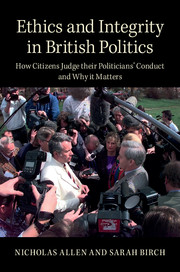 Ethics and Integrity in British Politics
Ethics and Integrity in British Politics Book contents
- Frontmatter
- Dedication
- Contents
- List of Figures
- List of Tables
- Preface and acknowledgements
- 1 Why study perceptions of politicians’ conduct?
- 2 Thinking about political ethics and conduct
- 3 Ethics and misconduct in British politics
- 4 Expectations and the scope of ethical judgements
- 5 How people judge political conduct
- 6 What people think of their elected politicians
- 7 The political effects of ethical evaluations
- 8 Changing public perceptions: problems and remedies
- 9 Concluding remarks
- Appendix: data and variable construction
- References
- Index
5 - How people judge political conduct
Published online by Cambridge University Press: 05 February 2015
- Frontmatter
- Dedication
- Contents
- List of Figures
- List of Tables
- Preface and acknowledgements
- 1 Why study perceptions of politicians’ conduct?
- 2 Thinking about political ethics and conduct
- 3 Ethics and misconduct in British politics
- 4 Expectations and the scope of ethical judgements
- 5 How people judge political conduct
- 6 What people think of their elected politicians
- 7 The political effects of ethical evaluations
- 8 Changing public perceptions: problems and remedies
- 9 Concluding remarks
- Appendix: data and variable construction
- References
- Index
Summary
The decision has to be made in the best interests of the people, not the politicians.
(Male focus group participant, Egham)In the previous chapter we found that the British public is a demanding master, holding its elected representatives to very high standards. In this chapter we consider how members of the public go about the task of evaluating political conduct in practice and how their judgements are affected by the information to which they are exposed. Our starting point is the somewhat puzzling observation that most people appear to have little difficulty making up their mind about politicians. Though the vast majority of the public has almost no direct contact with elite politics or experience of what the day-to-day job of an MP, or minister or any other elected politician involves, they nevertheless find the task of judging the behaviour of political actors relatively straightforward. We are so used to reading about survey results on confidence in politicians that this fact does not at first seem extraordinary. But on further thought, the facility with which people judge their leaders’ professional actions is rather odd, given the many unusual features of political roles and the complex challenges faced by those who perform them. The analyses presented in this chapter are devoted to understanding aspects of how ordinary members of the public go about this task.
Since political conduct and misconduct is largely mediated, it is crucial to understand just how information reaches people. One piece of the puzzle is how the information presented to people shapes responses. The other piece is the way the mass media ‘mediate’ the information people employ to make up their minds. This chapter is structured around these two themes. It first considers how common norms shape and frame ethical evaluations, drawing on three survey experiments that enabled us to manipulate precisely the information that respondents received. It then considers how the source of information affects reactions to ambiguous actions undertaken by politicians, using some of the data on acts of ‘grey’ corruption with which we were familiarised in Chapter 4.
- Type
- Chapter
- Information
- Ethics and Integrity in British PoliticsHow Citizens Judge their Politicians' Conduct and Why it Matters, pp. 89 - 114Publisher: Cambridge University PressPrint publication year: 2015


